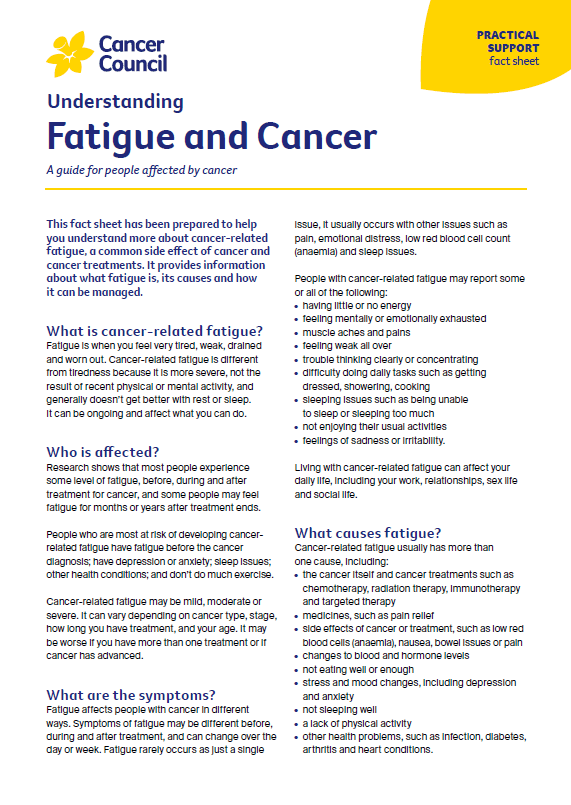- Home
- Pleural mesothelioma
- Managing symptoms
- Difficulty sleeping
Difficulty sleeping
Getting a good night’s sleep is important for maintaining your energy levels, reducing fatigue, and improving mood. Difficulty sleeping may be caused by pain, breathlessness, anxiety or depression. Some medicines can also disrupt sleep.
If you had sleep problems before the pleural mesothelioma diagnosis, these could become worse. Talk to your doctor about what might be helpful for you. Medicines you are taking may need adjusting or you may need other drugs to help you sleep. Strategies that may be helpful in improving your sleep quality are listed below.
Getting a better night’s sleep
- Try to do some gentle exercise daily. This will help you sleep better. Talk to a physiotherapist or exercise physiologist, who can tailor an exercise program, and an occupational therapist, who can suggest equipment to help you move safely. Learn more about exercise and cancer.
- Limit or cut out the use of alcohol, caffeine, nicotine and spicy food.
- Avoid television or using computers or smartphones before bed, as the blue light may tell your body it’s time to wake up.
- Follow a regular routine before bed and set up a calm sleeping environment. Make sure that the room is dark, quiet and a cool temperature.
- Try soothing music, a recording of rain sounds, or a relaxation recording. Listen to our Sleep and Cancer podcast episode below and our meditation and relaxation podcast for more tips.
→ READ MORE: Managing breathlessness
Podcast: Sleep and Cancer
Listen to more episodes from our podcast for people affected by cancer
More resources
All updated content has been clinically reviewed by A/Prof Anthony Linton, Medical Oncologist, Concord Cancer Centre and Concord Repatriation General Hospital, NSW; Dr Naveed Alam, Thoracic Surgeon, St Vincent’s Private Hospital Melbourne and Monash Medical Centre, VIC; Prof David Morris, Peritonectomy Surgeon, St George Hospital and UNSW, NSW. This edition is based on the previous edition, which was reviewed by the following panel: A/Prof Anthony Linton (see above); Dr Naveed Alam, (see above); Donatella Arnoldo, Consumer; Polly Baldwin, 13 11 20 Consultant, Cancer Council SA; Dr Melvin (Wee Loong) Chin, Medical Oncologist, Sir Charles Gairdner Hospital and National Centre for Asbestos Related Diseases, WA; Prof Kwun Fong, Thoracic and Sleep Physician and Director, UQ Thoracic Research Centre, The Prince Charles Hospital, and Professor of Medicine, The University of Queensland, QLD; Vicki Hamilton OAM, Consumer and CEO, Asbestos Council of Victoria/ GARDS Inc., VIC; Dr Susan Harden, Radiation Oncologist, Peter MacCallum Cancer Centre, VIC; Penny Jacomos, Social Worker, Asbestos Diseases Society of South Australia, SA; Prof Brian Le, Director, Parkville Integrated Palliative Care Service, The Royal Melbourne Hospital and Peter MacCallum Cancer Centre, VIC; Lung Cancer Support Nurses, Lung Foundation Australia; Jocelyn McLean, Mesothelioma Support Coordinator, Asbestos Diseases Research Institute, NSW; Prof David Morris (see above); Joanne Oates, Registered Occupational Therapist, Expert Witness in Dust Diseases, and Director, Evaluate, NSW; Chris Sheppard and Adam Barlow, RMB Lawyers.
View the Cancer Council NSW editorial policy.
View all publications or call 13 11 20 for free printed copies.

